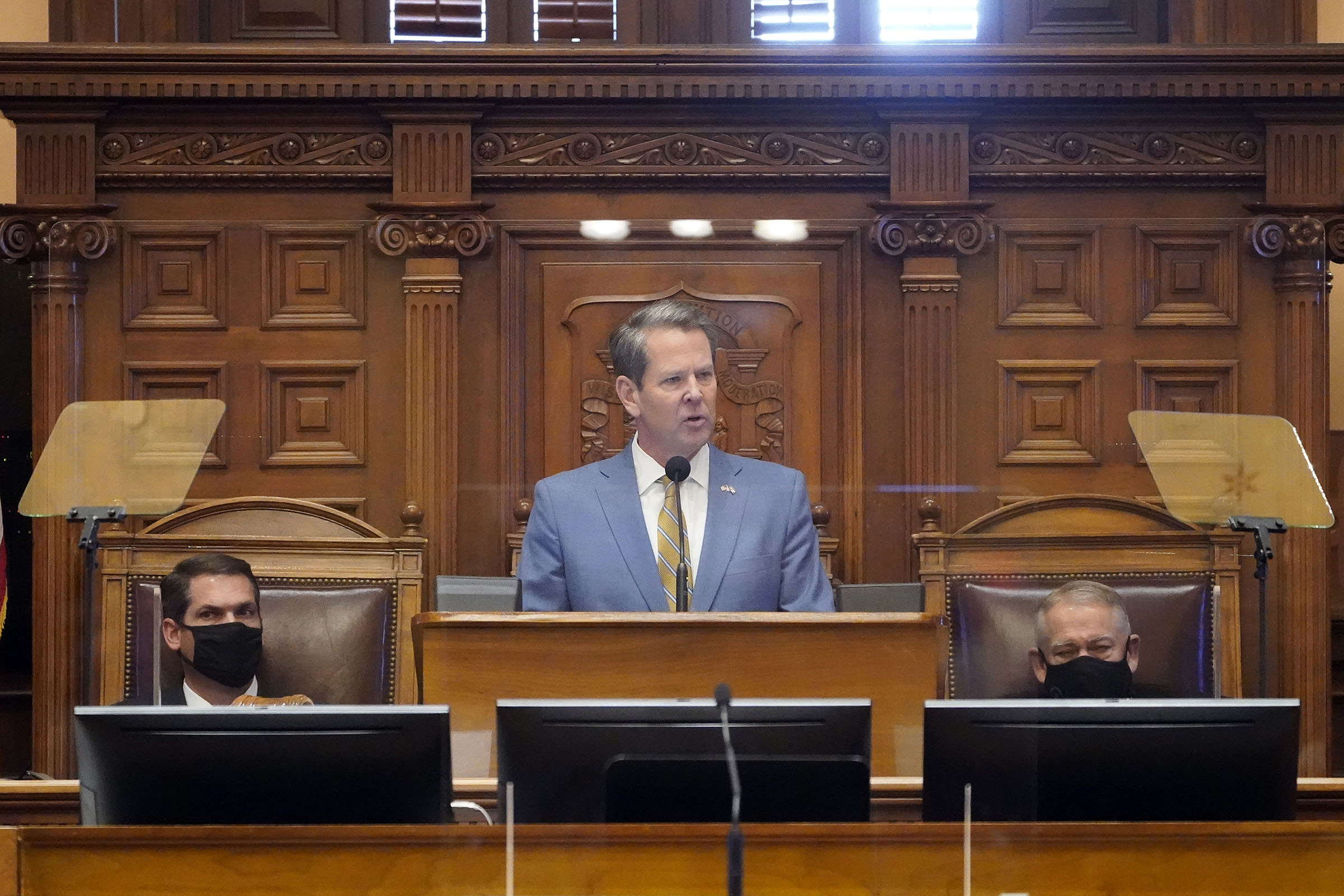In his second state of the state address as Governor of Georgia, Brian Kemp reflected on the bruising past year, which featured a deadly pandemic that continues to rage in Georgia and a high-profile political battle with President Donald Trump.
As the state continues to see rising coronavirus infections, hospitalizations and deaths, he vowed Georgia would “win this fight against COVID-19” and asserted the state “while battered, is not broken.”
“One year ago, I had no idea what we would experience in 2020 – what we would endure, the storms we would face,” Kemp said to a joint session of the State House and Senate.
“We didn’t know that our prosperity and our economy would be undermined at the same time that our health and well-being was threatened. We didn’t know all of the challenges ahead, all of the impossible decisions to make; all of the struggle, pain, and grief,” he said.
“We didn’t know that political division would generate ridiculous and harmful conspiracies, lawlessness, and death.”
Of the COVID-19 pandemic, Kemp said, “we can now see the light at the end of this tunnel,” pointing out that 283,000 Georgians had been vaccinated as of Wednesday.
He also thanked health care workers who have “literally faced hell on earth” and highlighted the dedication of federal CARES act dollars to supplement healthcare staffing last year.
Grady Memorial Hospital in Atlanta–the largest in the state–is now one of many in Georgia having their capacity strained thanks to the pandemic.
And the situation shows little sign of improvement. According to the latest White House Coronavirus Task Force report, Georgia is eighth in the nation for test positivity, is in the red zone again, and is in “full pandemic resurgence.”
House Minority Leader James Beverly painted a different picture of the pandemic in response to Kemp’s remarks. “The Governor asked us not to relive or relitigate 2020,”’ he said. “But 2020 has led to worsening conditions because we didn’t do what we needed to do in the beginning.”
More than 10,000 Georgians have died of complications from the virus. In the last week, the state set a new one-day record for COVID-19 fatalities, then nearly broke that record the next day.
Despite numbers that continue to worsen and ongoing calls from the Trump administration for the implementation of stronger COVID-19 mitigation measures, the public health guidance from the state has not changed for months.
Kemp also announced several legislative priorities, including “significant reforms” to the state’s citizen’s arrest statute. That statute has come under intense scrutiny after the killing of Ahmaud Arbery in Brunswick, Georgia, last year. Kemp said it would be a step towards a “better, safer, and more just future for our state.”
Kemp highlighted Georgia’s unemployment rate of 5.7%, which falls below the national average, as well as the state’s recent economic development announcements, and revisited the criticism he received for being one of the first states to reopen after coronavirus lockdown in the spring.
“The governor this morning chose to tout his leadership during the crisis as he reopened businesses this summer,” Beverly said. “Rather than heed the warnings of public health experts across this country, he reopened bars, nightclubs, and tattoo parlors just as numbers were about to get worse.”
“For news cycle after news cycle, it seemed like the only voices given a megaphone were from the elites, those who could work from home long-term, and those who had the resources to shelter in place for months on end,” Kemp said.
“But the voices I heard were the voices of men and women from Bainbridge to Bolingbroke to Baldwin, who had spent years building their business, creating jobs, sowing a harvest they hoped to one day reap for themselves and their families literally days away from losing it all.”
Kemp announced he plans to prioritize “a natural next step” of the state’s PPE Tax Credit, which encouraged in-state production of critical health care supplies, by extending it to cover pharmaceutical and medical equipment manufacturers.
He confirmed that the state will not face budget cuts this year. Last summer, the state was forced to trim more than $2 billion from the budget because of the recession caused by the coronavirus. “We find ourselves in an economic position that many other states should envy,” he said.
Kemp highlighted a range of priorities in his proposed budget, including $1,000 one-time supplements for all teachers and school employees. Kemp campaigned on a pledge to raise teacher pay, which was slowed down last year.
He also proposed a $5 million pilot program to target a drop in higher education enrollment brought on by the coronavirus pandemic.
Kemp addressed the General Assembly just a week after Georgia Republicans lost both Senate seats and months after President-elect Joe Biden won the state’s electoral college votes.
Kemp did make any mention of electoral law changes in his speech.
He has been supportive of requiring photo ID for absentee ballots but did not list it as a priority Thursday.
Still, Democratic state Sen. Elena Parent highlighted combatting any tightening of voting rules as a Democratic legislative priority: “These barriers don’t prevent fraud. They prevent democracy,” she said. ‘As Democrats, we know our policies are the ones preferred by a majority of Georgians. We aren’t afraid to let people vote.”










WABE reporter Christopher Alston contributed to this report.